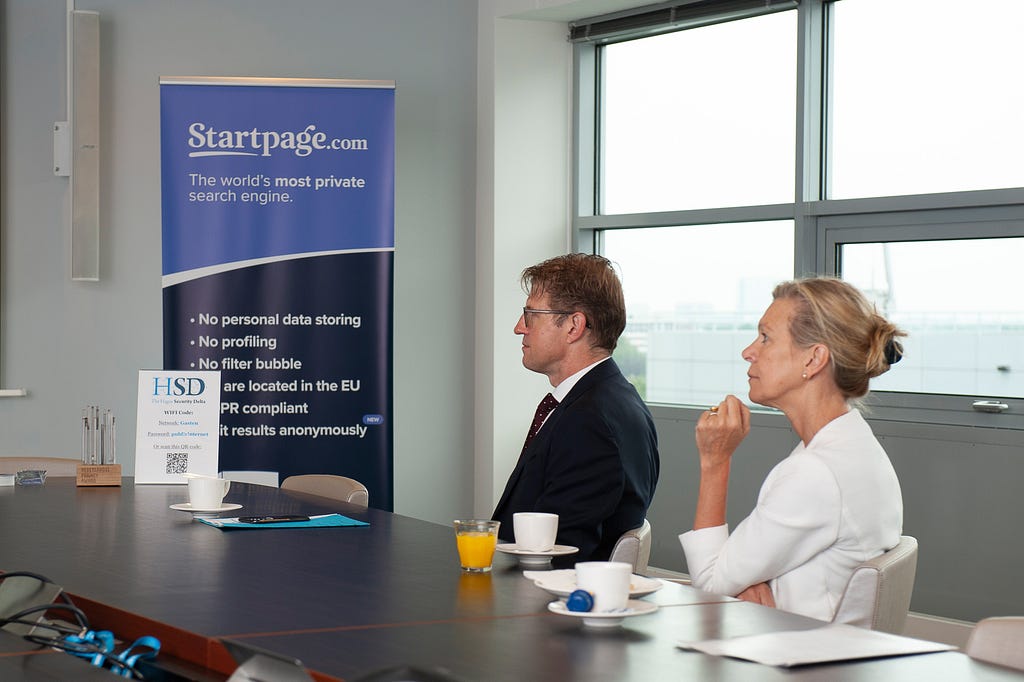Latest news about Bitcoin and all cryptocurrencies. Your daily crypto news habit.
Governments look to for-profit companies like Startpage.com and DuckDuckGo for solutions
 Dutch Legal Protection Minister Sander Dekker and Startpage.com Business Development Director Alex van Eesteren discuss privacy during a recent working visit
Dutch Legal Protection Minister Sander Dekker and Startpage.com Business Development Director Alex van Eesteren discuss privacy during a recent working visit
Privacy concerns have reached an all-time high, and citizens are looking to their governments for solutions. But is legislation the best or only way to reign in the surveillance economy?
Europe’s General Data Protection Regulation (GDPR) has been a big step forward for privacy, but it’s not perfect. GDPR breach notification rules have worked well, but many privacy experts aren’t as impressed with the provisions that are supposed to dissuade companies from mishandling consumer data. Consumers still find themselves at the mercy of big companies like Facebook if they want to experience all the Internet offers.
In the midst of this data crisis, lawmakers have started looking to for-profit, privacy-focused companies for ideas on how the free marketplace might help with solutions. Two of these are the privacy search engines Startpage.com and DuckDuckGo.
Startpage.com ~ the world’s most private search engine Dutch Legal Protection Minister Sander Dekker and Director General for the Administration of Justice and Law Enforcement Anita Vegter visit Startpage.com to learn more about how the company protects consumers.
Dutch Legal Protection Minister Sander Dekker and Director General for the Administration of Justice and Law Enforcement Anita Vegter visit Startpage.com to learn more about how the company protects consumers.
Dutch Legal Protection Minister Sander Dekker sent a “vision letter” to his country’s House of Representatives recently to spur a debate about how the government in the Netherlands can help its citizens take back their online privacy. In the letter, he pointed to the search engine Startpage.com as an example of how private companies can help:
“It is important that people become more aware of the consequences of sharing personal data,” Dekker wrote in his letter. “Dutch initiatives such as the search engine Startpage.com, where no personal data is stored, contribute to the protection of the privacy of citizens.”
 Dutch Legal Protection Minister Sander Dekker looks on as Startmail.com Product Manager Raúl Maduro shares recent privacy innovations
Dutch Legal Protection Minister Sander Dekker looks on as Startmail.com Product Manager Raúl Maduro shares recent privacy innovations
Dekker and the Dutch Director General for the Administration of Justice and Law Enforcement Anita Vegter followed that letter with a working visit to Startpage.com headquarters. They met with Team members to discuss how its private search engine protects consumer privacy while still making a profit.
Startpage.com never logs or shares user personal information. Once users search in privacy they can also visit websites they find in privacy using the free “Anonymous View” feature. The Netherlands-based company makes money through non-targeted advertising. It also has a paid privacy-friendly email service, Startmail.com.
DuckDuckGo ~ the search engine that doesn’t track you DuckDuckGo CEO Gabriel Weinberg
DuckDuckGo CEO Gabriel Weinberg
European governments are not alone in looking to the free marketplace for privacy solutions. Chairman of the U.S. Senate Judiciary Committee Lindsey Graham invited the head of U.S.-based private search engine DuckDuckGo to present testimony in March about how it makes money while protecting consumers.
 The U.S. Senate Judiciary Committee hearing on GDPR & CCPA: Opt-ins, Consumer Control, and the Impact on Competition and Innovation, March 12, 2019
The U.S. Senate Judiciary Committee hearing on GDPR & CCPA: Opt-ins, Consumer Control, and the Impact on Competition and Innovation, March 12, 2019
CEO Gabriel Weinberg told Senators how his private search engine is able to make a profit by serving non-targeted advertising:
“…Take our business for example: When you type in a search on DuckDuckGo, we simply show you ads related to that search. If you search for ‘car’, we show you car ads. But those ads won’t follow you around, because we don’t know who you are, where you’ve been, or where you go. It’s contextual advertising versus behavioral advertising.”
DuckDuckGo and Startpage.com have similar business models that prove it is not necessary to siphon user data in order to make money. They take the same results consumers can get at “regular” tracking search engines and serve them up without logging user personal information or setting tracking cookies. DuckDuckGo delivers mainly Yahoo /Bing search results in privacy. Startpage delivers mainly Google search results in privacy. Both search engines also draw results from other sources for features like instant answers.
Startpage.com and DuckDuckGo just happen to both be search engines, but there are other examples of profitable companies that make money while still respecting user privacy.
I expect to see more government focus on for-profit privacy alternatives in the future, in addition to calls for new consumer privacy legislation. Legislation is essential, but often imperfect, reactive and slow to implement. Privacy-focused for-profit companies, on the other hand, are proactive and move quickly without needing to find consensus in the midst of conflicting political and economic priorities.
The free marketplace just may help save privacy — or at least stave off dystopia until legislation catches up.
Can the Free Market Save Privacy? was originally published in Hacker Noon on Medium, where people are continuing the conversation by highlighting and responding to this story.
Disclaimer
The views and opinions expressed in this article are solely those of the authors and do not reflect the views of Bitcoin Insider. Every investment and trading move involves risk - this is especially true for cryptocurrencies given their volatility. We strongly advise our readers to conduct their own research when making a decision.